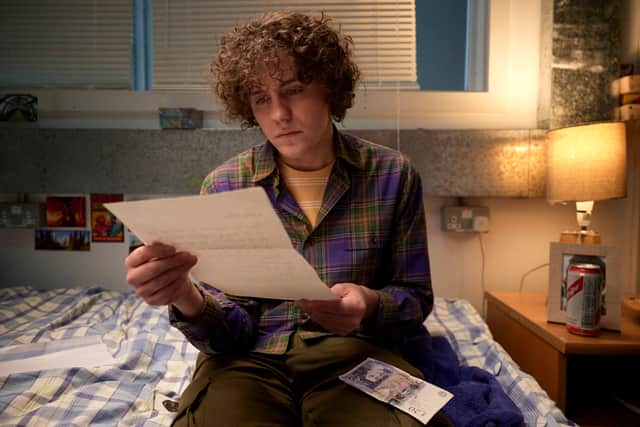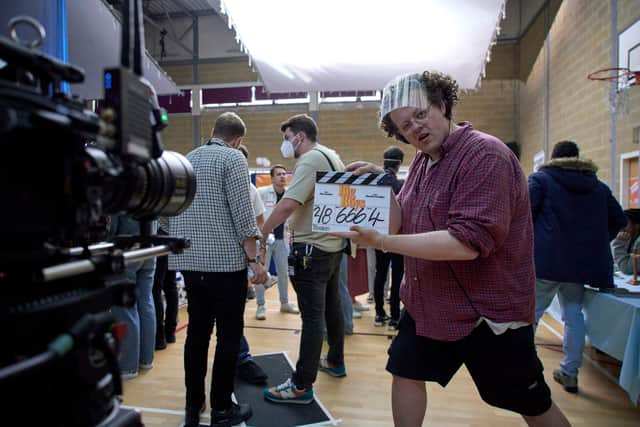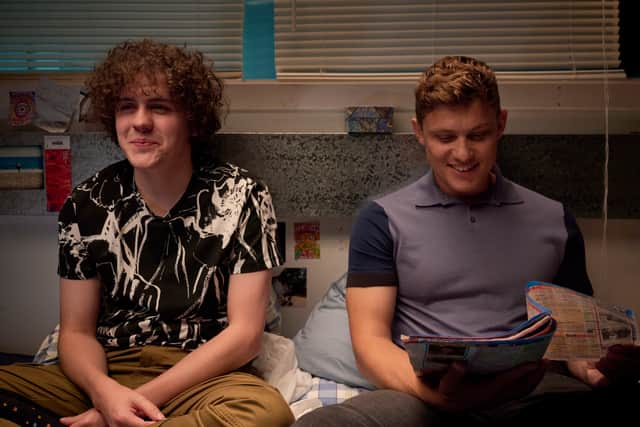Jack Rooke on his Channel 4 sitcom Big Boys: ‘It is a very vulnerable thing, making a show about grief’
and live on Freeview channel 276
Jack Rooke is the writer and creator of Big Boys, a new Channel 4 sitcom based on his own life. The series is about the unlikely friendship that develops between two mismatched university housemates: boisterous and laddish Danny (Jon Pointing) and shy and closeted Jack (Dylan Llewellyn), still grieving after the recent death of his father.
Rooke recently spoke to NationalWorld about the production of Big Boys, from its basis in his Edinburgh Fringe Festival shows to how he learned to write television scripts for the first time. He also explained why Dylan Llewellyn was the perfect choice to play his younger self, how he draws on and writes about personal experiences in a healthy way, and more.
Advertisement
Hide AdAdvertisement
Hide AdWe’re speaking about a week before the show comes out [Big Boys arrives on Channel 4 on Thursday 26 May]. How are you feeling?
I’m really excited! I was quite nervous, actually, I was more nervous last week, before the trailer was coming out and [we were] getting everything ready. Whereas now actually, this week’s been a bit more fun. I feel very lucky. Actually, if anything, I felt quite grateful: the show’s taken about five years, from me first starting to write it to now.
So many shows, especially when you’re a first-time TV writer, could so easily all go wrong, and it can so easily not happen. I feel sort of like for the first time in my life, I’ve managed to actually complete the race! Well, very nearly, we’ve got another week - in my mind I’m like something could still happen to stop it, you know? I mean, hopefully, hopefully, nothing will. But yeah, it’s exciting.
So, as you were saying there, the show has been developing for the past five years. What was your starting point with Big Boys?
Advertisement
Hide AdAdvertisement
Hide AdWell, I suppose the very starting point was having done a couple of Edinburgh Fringe shows, testing the material, testing the characters and the story and the jokes, live on stage. There’s no better way of testing a comedy than, you know, with a roomful of people watching it. I met a producer at the time called Jon Petrie, who produced People Just Do Nothing and Stath Lets Flats, really amazing stuff.
He basically just took me under his wing. I went up to his house and stayed in his attic and wrote [laughs]. I learnt about character and learnt about story, and how you translate, I suppose, what works for a live audience to what works for a TV viewer, and how you create the world of television. So, it started there, and then has steamrolled on.
We handed it in quite a few months ago. I felt like, actually, I’m really glad that we’ve taken our time with it, and with making sure it came out at the right time. I really felt like I wanted, for Dylan, for Derry Girls to finish its journey first before Big Boys starts. I’m really always quite in awe of Lisa’s [Lisa McGee, creator Derry Girls] writing and how she’s managed to create the world of Derry Girls, and create something that’s so geographically specific yet broad and warm. In my mind, I’d love for Big Boys to sort of, you know, ‘fill the gap she’s leaving’, but [I] also know that it’s a very different show.


You mentioned Dylan there – obviously it must’ve been very strange casting a version of yourself for the show, so what was it that made you think Dylan was the right choice there? I know you knew each other a little bit already through Nicola Coughlan.
Advertisement
Hide AdAdvertisement
Hide AdWell, I think it’s three things. I feel like the first thing is just that he’s such a great comedy actor. He’s so good at responding and reacting to other people around him, he’s got chemistry with almost everyone. Dylan is so lovable, it’d be really hard to not have chemistry with him on set. I just wanted someone who had proven comedy chops, so to speak, and he’s got that.
Secondly, I really wanted someone who I felt resonated with a lot of my experiences in the show? Me and Dylan are a very similar age, we’ve been through similar things as teenagers, and we really bonded over a lot of those experiences. There was a three-year gap between making the pilot and filming the series, and in those three years, we – and all of the rest of the cast – have gotten to know each other [really well] actually and then so, I mean, and all the rest of the cast, see, so there was that.
And then thirdly, he had curly hair. He’s got it all, baby! He’s ticked my three boxes.
He’s playing a version of Jack – of you – that’s quite distinct from your narration of the show.
Advertisement
Hide AdAdvertisement
Hide AdA friend of mine, he saw it and was like, “He’s nothing like you now?” And I was like, “no, but he’s a bit like terrified teenage me.”
So, my voiceover is sort of coming from more of a stance of wisdom and of having figured myself out. But that definitely took a long time. Hopefully, if we get more series of the show, we’ll see Dylan’s Jack develop and come into his own a bit more and own himself slightly.
Do you think of the voiceover as you, or as another character that’s based on you, that you also happen to be playing? If that makes sense!
No, that does make sense… That’s quite a big question. I haven’t really thought of it much!
Advertisement
Hide AdAdvertisement
Hide AdThere is a narrative device at play, that, as the series goes on, you sort of realize what might be going on. I’ve liked leaving it a bit ambiguous. I think there’s a really nice thing about somebody recounting a memory – for me, the narrator’s purpose is to be like, here’s a memory, here’s a set of stuff that the narrator is nostalgic for. It’s building to something, it’s building to… a moment. I feel like I’ll be able to answer that question better when everyone’s seen it?
A lot of my favourite shows have always employed a really cool narrative device to help the story. I love Chewing Gum, and I feel like Chewing Gum was just really incredibly of its time. It was doing that direct address to camera before Fleabag even, and I felt like it was letting us into this world? The council estate she was on, the characters she knew – it felt so much like ‘I’m letting you in, come and join us, I’m going to give you a sneak peek of this world that I know that has been not represented for so long’. I felt like Chewing Gum did that amazingly.
And then I really love Desperate Housewives [laughs]. I see myself a bit like Mary Alice: you don’t see me, but you hear me throughout, telling you about these characters and telling you about these people. So, I wanted it to be a fusion of Chewing Gum meets Desperate Housewives!


Obviously, a lot of your work is quite personal, and I’d imagine that opening yourself up on that stage in that context is something that might be quite difficult itself. How do you maintain boundaries when you approach the work, and do it in a healthy way?
Advertisement
Hide AdAdvertisement
Hide AdIt’s something that I feel quite sort of... I suppose passionate to talk about, because I have made mistakes in my career before, and I have, to a certain extent, overshared and then regretted it. I think, especially when you’re a young person making stuff culturally, and it’s about really hard experiences or close-to-home experiences, you have got to have coping mechanisms and a support system in place.
On some projects, in the past, I definitely didn’t have that, and I wasn’t prepared for when things came out and the response [they got]. Vulnerable people do get in touch to say that they resonate with your story – which is amazing, but, you know, when you’re 24, and not a qualified psychotherapist, it can be quite a scary thing to be met with.
So this time around, with Big Boys, it’s been the opposite. I’ve really tried to have quite set boundaries over what I wanted to talk about outside of the show, and I feel like I’ve got a good support network. I’ve got friends I can talk to, I’ve got resources that I can send people to if they’re getting in touch with me for help.
Channel 4 have been incredible. I really am slightly sometimes in kind of disbelief [laughs] at how well run everything is there to look after us all, the cast included. I haven’t always had that experience working with big, big organizations, actually, they’ve got their money where their mouth is when it comes to supporting talent and mental health. That also really helps, knowing that I’ve got that backing.
Advertisement
Hide AdAdvertisement
Hide AdBut yeah, I think I’m always the first one to try and shout to safeguard people really, because it is a very vulnerable, exposing thing, especially making a show about the issues that are in Big Boys, like grief, mental health, depression, coming out. Stuff like that where, you know, even the actors have different relationships to those topics - I tried to make sure that everyone was looked after, because we should be able to tell these stories in a way that doesn’t impact our private and personal lives, [in a way that’s] about the work we’ve made.
On another note, just picking up on what you’ve been saying about Derry Girls and Desperate Housewives – were there any particular comedies that were an influence on Big Boys at all?
I think the biggest one for me is maybe Broad City, about two girls in New York. I felt like was an amazing example of writing a two-key-character-friendship and how that blossoms, and it’s still really funny and silly, they both support each other so much, and the madness of that. I love Broad City. Derry Girls is an obvious one. You know, so know half the cast really well [laughs]. I think Lisa has done a great job at writing something that’s funny and broad, yet still feels very specific to where she’s from. She’s got all of those Northern Irish little idioms, I think she’s done a great job.
What else? I’ve already said Chewing Gum. When I was a kid, I used to really love the Vicar of Dibley in a big way. And I think Alice Tinker is my favorite sitcom character of all time, still. And, last but not least, The Royle Family is probably one of the biggest inspirations for me from a writing perspective, for how they deal with an ensemble cast who all get a moment to shine in every episode, just sat watching telly, and I think is one of the greatest [shows]. So, yeah, all of those – all of which, I think, written by women, or fronted by women.


Advertisement
Hide AdAdvertisement
Hide AdIs there anything you can tell us about what you’re working on next potentially?
[laughs] Sorry, I just laughed because I’ve never been asked that question! I actually don’t know. What am I working on next? Fingers crossed more Big Boys, which would be great, and then I would really love to, am planning to, hoping to do more live comedy, too. After COVID, I’ve really missed performing. You know, I’ve done Edinburgh shows every other year since 2015, and I’ve not done one for two or three years now. I feel like next year, I’m gonna hopefully have another live comedy show to do and tour, and that’ll be really fun.
My favourite thing is testing out jokes in front of people, there’s nothing better. If COVID hadn’t happened, then I would have found a pub somewhere and read the Big Boys scripts to audiences to see what jokes work and what jokes don’t. Instead, I just had Twitter. I would just tweet jokes from the show and see if they did well – and quite a lot of them didn’t, so I’d delete the line from the script! I’m really excited to get back and be performing again.
Do you think you’ll always be writing about mental health in some way on some level? Even the alien who runs a bowling alley in space will be working through something?
Advertisement
Hide AdAdvertisement
Hide AdIf I was to write another show? Maybe. I don’t know. I’m sort of quite conscious that I would love to write something… soon [laughs and laughs] I would love to write another comedy that is more of an out-and-out sitcom. Big Boys is a comedy, obviously, but it’s got such a personal relationship with me, and has all these touching drama moments. I would love to, next time, write a sitcom and a drama, rather than a mix of.
Finally, what’s the most important thing you’d want someone to take away from Big Boys?
I feel like what I want people to take from it is a sense that they’ve watched something that could resonate with them, if that makes sense. Like, I know that, inherently, this show will be pitched as a sort of LGBTQ+ comedy, which is amazing, but I also felt the character of Danny is [because] I really want straight people to watch it and to love it.
[I want people] to understand, I suppose, the protectionism between those two characters: Jack looks out for Danny and Danny looks out for Jack. Whilst they’re both on their own individual journeys to discover themselves, they’re embarking on that side by side, they’re doing it together. Because that’s how friendship works, and it doesn’t matter if you’re pursuing different things – you know, one of you chatting up girls and the other one’s looking to meet guys [laughs]. Those things really pale into insignificance when it just comes down to friendship. It’s like an ode to friendship, ultimately, and how your friends are your chosen family that are going to help you through whatever.
Yeah, I think that was a nice point [laughs]
Comment Guidelines
National World encourages reader discussion on our stories. User feedback, insights and back-and-forth exchanges add a rich layer of context to reporting. Please review our Community Guidelines before commenting.
